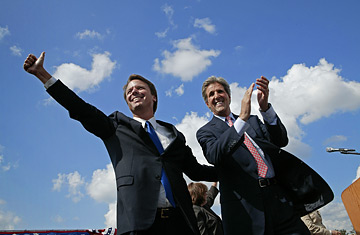
Democratic presidential candidate Senator John Kerry clapping as vice presidential candidate Senator John Edwards gives a thumbs-up at a rally in Dayton, Ohio, July 2004.
(2 of 2)
With McCain off the list, I walked from my house to Johnson's, which was next door, on a spring afternoon. The obvious vice-presidential choice, we agreed, was John Edwards; in the primaries, he'd emerged as a first-rate campaigner—and I told Jim that despite thiness on substance, I thought, as I been in 2000, that he could handle Cheney in a debate; We couldn't afford to repeat the Lieberman mistake. But there were two other clear possibilities: Dick Gephardt and Hillary Clinton. Kerry was ready to partner with Clinton if it was the way to win, but he doubted it was. He liked Gephardt, was confident he was up to the job of being president, and hoped he might help carry Missouri, which could make the difference in a close election. But both he and Teresa worried that Gephardt was a gray choice who wouldn't light any fires. While Edwards might, they were both uneasy with him. I'd said to Kerry early on that all I cared about was picking the strongest choice—personal feelings had nothing to do with it.
Johnson had compiled a list of about twenty-five "serious" candidates—and some others besides—and we reviewed it in his living room. In addition to Edwards, Clinton, and Gephardt, it included New Mexico governor Bill Richardson and some "out-of-the-box" choices, like Nebraska's maverick Republican senator Chuck Hagel, a kind of McCain surrogate. Hagel, who I guessed wouldn't accept and didn't know his name was on the list, was a nonstarter because he had a zero rating from the League of Conservation Voters. Richardson's prospects were shadowed by alleged womanizing. Publicly reluctant, he coveted the publicity of being considered, but withdrew before the process was finished.
A quiet round of polling helped guide the search. Hillary Clinton had high negatives—she would hurt the ticket; Dick Gephardt apparently didn't help in Missouri—in fact, Edwards's numbers were decidedly stronger there. When I heard this, I should have questioned whether the numbers actually reflected the ultimate impact of a Gephardt pick. As Kerry's running mate, Gephardt's campaigning and the institutional forces in Missouri might have given us a chance in the state, and he might have boosted us a little in Ohio, maybe just enough. But the process was evolving to where it had started—perhaps not in Kerry's mind, but in the conventional wisdom and the will of the Democrats across the country. When I handed Johnson a memo about advertising to be rolled out right after the choice was announced, I included a contingency for "a VP selection... from outside the present battleground states." Johnson and I both knew that meant North Carolina—and Edwards—but Kerry and Teresa still weren't there.
Kerry talked with several potential picks, including Gephardt and Edwards. He was comfortable after his conversations with Gephardt, but even queasier about Edwards after they met. Edwards had told Kerry he was going to share a story with him that he'd never told anyone else—that after his son Wade had been killed, he climbed onto the slab at the funeral home, laid there and hugged his body, and promised that he'd do all he could to make life better for people, to live up to Wade's ideals of service. Kerry was stunned, not moved, because, as he told me later, Edwards had recounted the same exact story to him, almost in the exact same words, a year or two before—and with the same preface, that he'd never shared the memory with anyone else. Kerry said he found it chilling, and he decided he couldn't pick Edwards unless he met with him again. When they did, Kerry tried to get a better personal feel for his potential number two; as rivals for national office since 2000, shortly after Edwards had entered the Senate, the two men hadn't spent a lot of time together. Kerry also wanted a specific reassurance. He asked Edwards for a commitment that if he was chosen and the ticket lost, Edwards wouldn't run against him in 2008. Edwards agreed "absolutely," as Kerry recalled him saying. If Kerry had shared this at the time, I would have told him what I did later: it was naive to think he could rely on a promise like that. Unlike Joe Lieberman, who'd been plucked from relative obscurity by Gore, Edwards had made his own mark in the primaries. He was ambitious—and if he saw his chance the next time, he was likely to go for it.
On the day the Edwards pick was made public, Edwards and I talked for the first time since I had informed him of our decision to work for Kerry and he had reacted angrily. He said he knew I'd helped get him on the ticket and he was grateful. I told him that I welcomed the possibility that we might be friends again, but that wasn't the reason for my preference. I believed it was the right move for Kerry. Kerry's relationship with Edwards would sour after the election—and mine would simply fade away. When Elizabeth discovered she had breast cancer, John and Teresa reached out to help the Edwardses find the best doctors they could. Marylouise and I called—but afterward, never heard from John again. Maybe we shouldn't have expected to. Kerry told me that the Edwardses simply stopped returning calls or talking to him and Teresa. Within months, Edwards started preparing for a bid in 2008. Kerry said that he wished he'd never picked Edwards, that he should have gone with his gut.
Copyright (c) 2007 by Robert Shrum. From the forthcoming book No Excuses by Robert Shrum, to be published by Simon & Schuster, Inc. Printed by permission.
